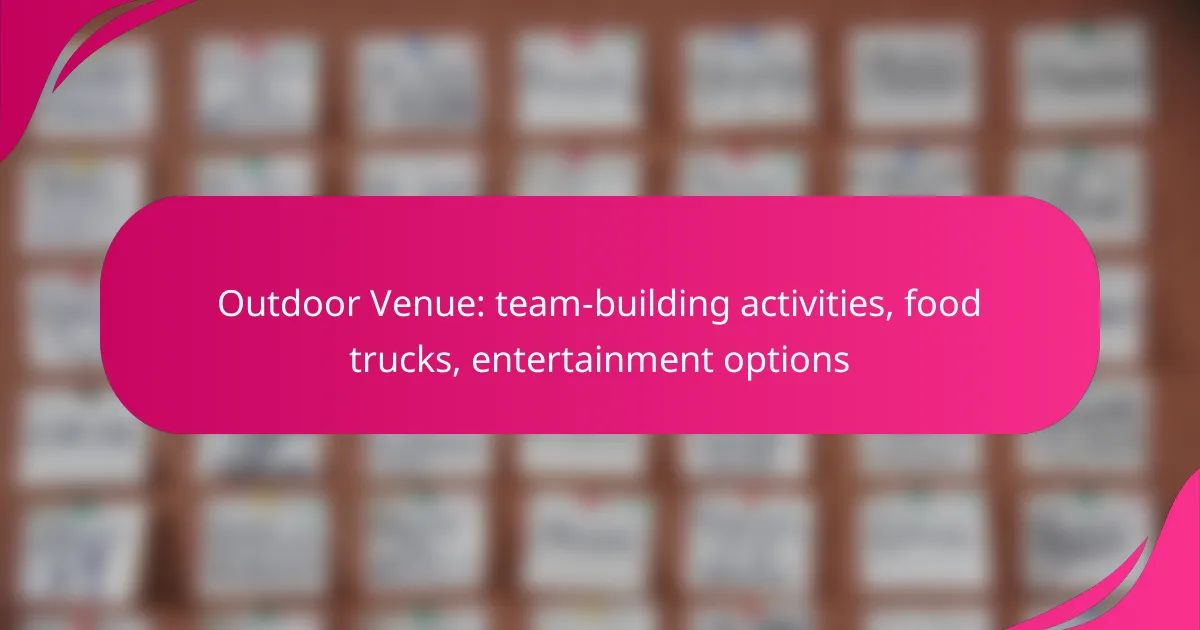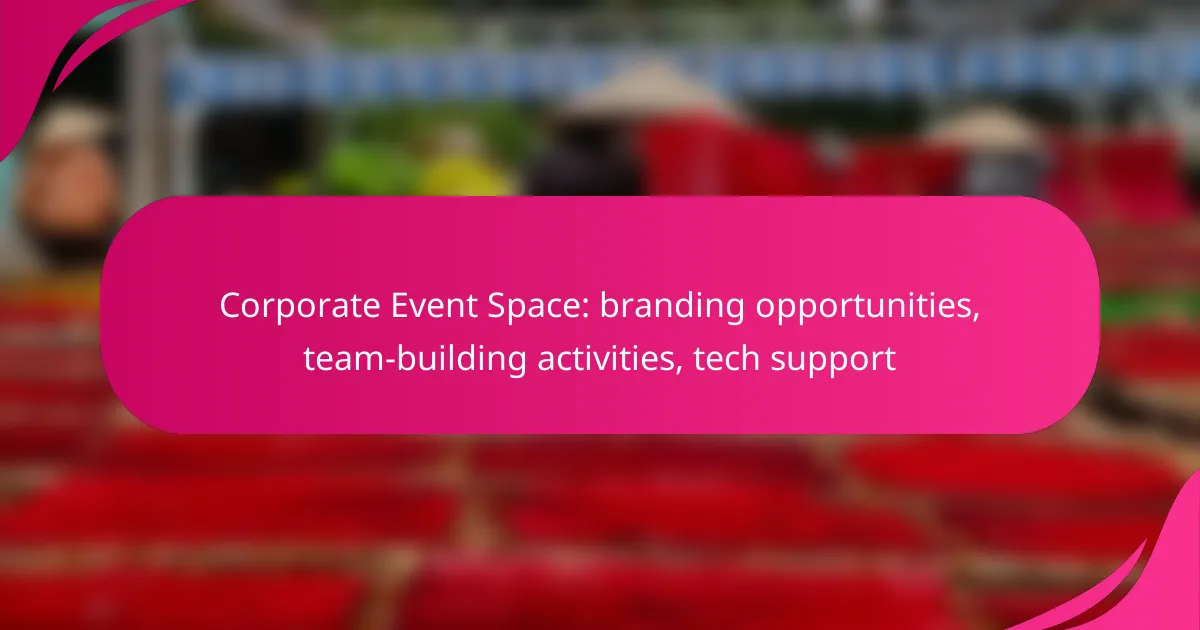Outdoor venues provide an ideal setting for team-building activities, offering a range of engaging experiences that foster collaboration and communication among participants. With the addition of food trucks, attendees can enjoy diverse culinary options that cater to various tastes, enhancing the overall atmosphere. Furthermore, entertainment options such as live music and interactive games can elevate the experience, making it both enjoyable and memorable for everyone involved.

What team-building activities are popular in outdoor venues?
Popular team-building activities in outdoor venues include a variety of engaging and interactive experiences that promote collaboration and communication among team members. These activities often leverage the natural environment to foster teamwork and can be tailored to suit different group sizes and objectives.
Obstacle courses
Obstacle courses challenge teams to work together to navigate physical tasks, fostering communication and problem-solving skills. These courses can be designed to accommodate various fitness levels, ensuring everyone can participate. Consider using local facilities that offer professionally designed courses for safety and engagement.
When planning, ensure the course includes a mix of physical and mental challenges to cater to diverse team strengths. Always have safety measures in place, including proper gear and supervision.
Scavenger hunts
Scavenger hunts encourage teams to collaborate in searching for items or completing tasks within a designated area. They can be customized to reflect company values or local landmarks, enhancing team bonding and creativity. Teams typically work in small groups, which promotes communication and strategic planning.
To organize an effective scavenger hunt, create a clear list of items or challenges, set time limits, and consider incorporating technology, such as mobile apps, to track progress and enhance engagement.
Outdoor workshops
Outdoor workshops provide hands-on learning experiences in a natural setting, allowing teams to develop new skills while working together. These workshops can cover a range of topics, from leadership training to creative problem-solving, and can be tailored to meet specific team needs.
When selecting a workshop, consider the interests and goals of your team. Engaging a professional facilitator can enhance the experience and ensure that learning objectives are met effectively.
Sports tournaments
Sports tournaments are a fun way to promote teamwork and friendly competition among colleagues. Common sports include soccer, volleyball, and relay races, which can be organized in local parks or sports facilities. These activities encourage physical fitness while fostering camaraderie.
To ensure inclusivity, consider forming mixed-ability teams and offering various sports options. Providing refreshments and awards can enhance the overall experience and motivate participation.
Team cooking challenges
Team cooking challenges allow participants to collaborate in preparing meals, promoting teamwork and creativity in a relaxed environment. These challenges can be held at outdoor venues with cooking facilities or even in local parks with portable equipment. Teams can compete to create the best dish based on specific themes or ingredients.
When organizing a cooking challenge, ensure that dietary restrictions are considered and provide all necessary equipment and ingredients. This activity not only fosters collaboration but also culminates in a shared meal, enhancing team bonding.

How can food trucks enhance outdoor events in the UK?
Food trucks can significantly enhance outdoor events in the UK by providing diverse culinary options, fostering local partnerships, and allowing for customizable menus. They create a vibrant atmosphere and cater to various dietary preferences, making events more enjoyable for attendees.
Diverse cuisine options
Food trucks offer a wide range of cuisine options, from traditional British fare to international dishes. This variety allows event organizers to cater to different tastes and dietary needs, such as vegetarian, vegan, and gluten-free choices. Popular options include gourmet burgers, artisanal pizzas, and ethnic street food, ensuring there is something for everyone.
By incorporating diverse food trucks, events can create a more inclusive dining experience. Attendees are more likely to enjoy their meals and engage with the event when they have multiple delicious choices available.
Local food truck partnerships
Partnering with local food trucks can enhance community engagement and support small businesses. Many food trucks in the UK pride themselves on using locally sourced ingredients, which can appeal to environmentally conscious attendees. This collaboration not only boosts the event’s appeal but also strengthens local economies.
When selecting food trucks, consider those with a strong local presence and positive reviews. This can ensure quality food and service, enhancing the overall experience for guests.
Customizable menus
Food trucks often provide customizable menus, allowing event organizers to tailor offerings to their audience’s preferences. This flexibility can include creating special dishes or accommodating specific dietary restrictions. For example, a food truck might offer a build-your-own taco bar or a selection of gourmet sandwiches.
When planning an event, discuss menu options with food truck vendors early on. This ensures that the final offerings align with your event’s theme and guest preferences, maximizing satisfaction and engagement.

What entertainment options are available for outdoor venues?
Outdoor venues offer a variety of entertainment options that enhance the experience for team-building activities. From live music to interactive games, these options can create a vibrant atmosphere that encourages engagement and collaboration.
Live music performances
Live music performances can significantly elevate the ambiance of an outdoor venue. Hiring local bands or musicians can provide a unique touch, catering to diverse musical tastes and preferences. Consider scheduling performances during peak activity times to maximize enjoyment.
When selecting artists, aim for a mix of genres to appeal to all attendees. Budgeting for live music typically ranges from a few hundred to several thousand dollars, depending on the artist’s popularity and the event’s scale.
Outdoor movie screenings
Outdoor movie screenings are a popular choice for entertainment at outdoor venues, creating a relaxed and enjoyable atmosphere. Setting up a large screen and providing comfortable seating can transform the space into a cozy cinema under the stars.
To organize a successful screening, choose films that resonate with your audience and consider providing snacks like popcorn or food truck options. Licensing fees for public screenings can vary, so ensure you secure the necessary permissions in advance.
Interactive games
Interactive games are excellent for fostering teamwork and camaraderie during outdoor events. Options include team-building activities like scavenger hunts, relay races, or obstacle courses that encourage collaboration and friendly competition.
When planning interactive games, consider the space available and the number of participants. Incorporating prizes or incentives can boost engagement. Ensure that all activities are safe and suitable for the participants’ age and abilities to avoid any mishaps.

What factors should you consider when choosing an outdoor venue?
When selecting an outdoor venue, consider location accessibility, capacity and layout, and available amenities and facilities. These factors will significantly impact the success of your event and the overall experience for participants.
Location accessibility
Location accessibility is crucial for ensuring that all participants can easily reach the venue. Look for venues that are near major transportation routes and have ample parking options. Public transport access can also enhance convenience for attendees who do not drive.
Consider the distance from your organization to the venue. Ideally, it should be within a reasonable travel time, typically no more than 30 minutes for local events. Ensure that the route is straightforward and well-marked to avoid confusion.
Capacity and layout
Capacity and layout are essential for accommodating your group comfortably. Verify that the venue can handle the expected number of participants, allowing for movement and interaction. A good rule of thumb is to allow at least 10 square meters per person for activities and dining.
Evaluate the layout to ensure it supports your planned activities. For team-building exercises, look for open spaces that can facilitate group activities. If you plan to have food trucks, ensure there is enough room for them to set up and for guests to queue without congestion.
Amenities and facilities
Amenities and facilities can greatly enhance the experience at your outdoor venue. Check for essential services such as restrooms, electricity access, and shaded areas for comfort. These features can make a significant difference, especially during hot weather.
Consider additional amenities like Wi-Fi, seating arrangements, and catering options. If food trucks are part of your plan, confirm that the venue allows them and has the necessary infrastructure for waste disposal and power supply. Always review any local regulations regarding food service to ensure compliance.

How do you plan a successful outdoor team-building event?
Planning a successful outdoor team-building event involves setting clear objectives, selecting suitable activities, and managing logistics effectively. By focusing on these key areas, you can create an engaging experience that fosters teamwork and collaboration.
Define objectives and goals
Start by identifying the main objectives of your team-building event. Consider what you want to achieve, such as improving communication, enhancing problem-solving skills, or boosting morale. Clear goals will guide your planning process and help measure success.
Involve team members in defining these objectives to ensure alignment and buy-in. This collaborative approach can lead to more meaningful outcomes and increased participation.
Select appropriate activities
Choose activities that align with your defined objectives and cater to the interests and abilities of your team. Options may include outdoor challenges, workshops, or fun games designed to promote teamwork. Aim for a mix of physical and mental activities to engage all participants.
Consider the duration and complexity of each activity. For example, a half-day event might include two to three activities, while a full day could allow for more extensive team challenges. Always ensure that activities are safe and accessible for everyone involved.
Coordinate logistics and permits
Effective logistics coordination is crucial for a smooth event. This includes securing a suitable outdoor venue, arranging transportation, and ensuring necessary permits are obtained. Check local regulations regarding outdoor gatherings, as some areas may require permits for specific activities or group sizes.
Additionally, plan for food and entertainment options. Food trucks can provide a variety of meal choices, making it easier to cater to different dietary preferences. Ensure that you have a backup plan for inclement weather, such as tents or an alternative indoor location.

What are the benefits of outdoor team-building activities?
Outdoor team-building activities enhance collaboration and foster stronger relationships among team members. They provide a unique environment that encourages engagement, creativity, and problem-solving, ultimately leading to improved workplace dynamics.
Improved teamwork and communication
Outdoor team-building activities significantly boost teamwork and communication skills. By participating in group challenges and games, team members learn to rely on each other, share ideas, and communicate effectively under pressure.
Consider activities like obstacle courses or scavenger hunts, which require teams to strategize and work together to achieve common goals. These experiences help break down barriers and promote open dialogue, leading to a more cohesive work environment.
To maximize the benefits, choose activities that align with your team’s interests and capabilities. Avoid overly competitive events that may create tension; instead, focus on collaborative tasks that encourage support and camaraderie among participants.



